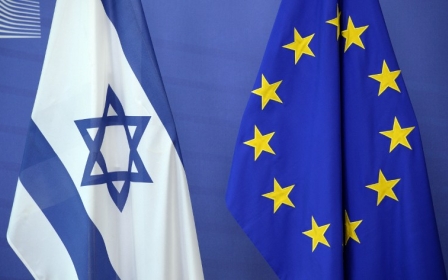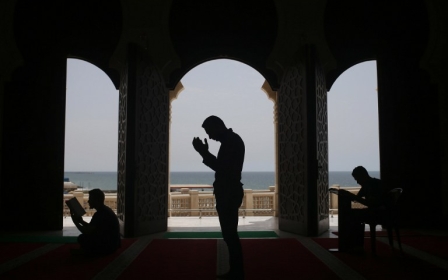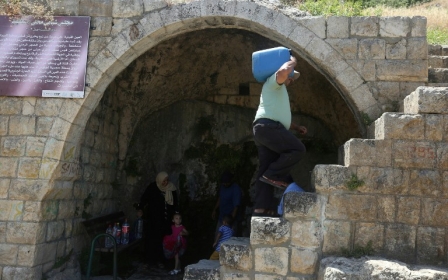A welcome week of good news for UK's Palestine solidarity

This week saw two setbacks in efforts by Israel’s supporters in the UK to undermine Palestine solidarity activism, and the Boycott, Divestment, and Sanctions (BDS) campaign in particular.
The first came at the High Court in London, where Jewish Human Rights Watch – a relatively new organisation founded by a man described by Conservative leadership candidate Michael Gove as a "great friend" – suffered a defeat in its legal action against three local authorities that passed resolutions in support of Palestinian rights.
The ruling dismissed the argument made by the pro-Israel group that the resolutions in question, passed by Leicester, Swansea and Gwynedd councils, were unlawful, and stated that "the court should be vigilant to protect the right of freedom of expression".
In particular, the court rejected the claim made by Jewish Human Rights Watch that the resolutions, which expressed varying degrees of support for a boycott of Israeli goods and criticism of Israel’s violations of international law, necessarily constituted attacks on the Jewish community in Britain.
The ruling, which the claimants say they will appeal, is a defeat for pro-Israel advocates’ lawfare strategy, and recalls an employment tribunal’s resounding rejection in 2013 of accusations of anti-Semitism brought against the British trade union, University and College Union, by a pro-Israel activist.
Two days after the High Court judgement, Shami Chakrabarti launched her long-awaited report into the Labour Party, anti-Semitism, and other forms of racism. Contrary to the hysterical claims made about a "cancer" of anti-Semitism in the party (as former London mayor Boris Johnson put it), Chakrabarti concluded that Labour "is not overrun by anti-Semitism, Islamophobia or other forms of racism".
The report, whose vice-chairman was David Feldman, the director of the Pears Institute for the studies of anti-Semitism at Birkbeck College, ignored the entreaties of a number of groups and organisations to effectively equate anti-Zionism with anti-Semitism, and was mute on the topic of Israel boycotts.
That the Chakrabarti report fell short of what pro-Israel groups had hoped for is clear when you read the submission by the Board of Deputies of British Jews. According to the board, "any exceptional treatment of Israel, where Israel is uniquely subjected, among all the countries in the world, to hostile behaviours such as denial of its right to exist and boycotts" is anti-Semitic.
After the release of the report on Thursday, board president Jonathan Arkush could not hide his disappointment, bemoaning the fact that the report is "weak on the demonisation of Israel".
Or take the joint submission by the Community Security Trust (CST) and Jewish Leadership Council to the Chakrabarti inquiry, which defines Zionism as "an ideological belief in the authenticity of Jewish peoplehood and that the Jewish people have the right to a state," and anti-Zionism as "the rejection of those two concepts".
Nothing about the Palestinians, or what it has meant, in practice, to establish a "Jewish state" in Palestine. Or why those consequences – historic and ongoing dispossession and discrimination – might inform someone’s anti-Zionism and solidarity with the Palestinians.
Nothing about why the "right to a state" does not mean the "right to colonisation".
That the Chakrabarti report failed to deliver the goods from the point of view of pro-Israel groups was likely a factor behind the ludicrous headlines about Jeremy Corbyn "comparing Israel to Islamic State".
Chakrabarti expressed sadness at how the Labour leader’s remarks at the report’s launch were misrepresented in the media and overshadowed the hard work that had gone into the inquiry.
Israel and its supporters in Britain currently have in their sights three separate, but related, targets: BDS, anti-Zionism, and Palestine solidarity activism itself.
Of course, they say, criticism of Israeli policies is not itself anti-Semitic – but why do you single out Israel? The question hangs in the air, doing its work by way of insinuation and a wink.
It is heartening that two significant efforts to undermine, obstruct, and delegitimise BDS – via the courts, and through the Chakrabarti inquiry – have come to naught.
But those who seek to shield Israel from scrutiny and accountability will not give up. Attempts to redefine anti-Semitism so as to dehumanise Palestinians and delegitimise solidarity will continue.
But for those who value political freedoms, for those who support the Palestinian call for a boycott and an end to Israeli impunity, it has been a week of some welcome good news.
- Ben White is the author of Israeli Apartheid: A Beginner’s Guide and Palestinians in Israel: Segregation, Discrimination and Democracy. He is a writer for Middle East Monitor, and his articles have been published by Al Jazeera, al-Araby, Huffington Post, The Electronic Intifada, The Guardian’s Comment is free, and more.
The views expressed in this article belong to the author and do not necessarily reflect the editorial policy of Middle East Eye.
Photo: Pro-Palestinian demonstrators attend a mass rally in support of the embattled Gaza Strip in London on 9 August, 2014 (AFP).
New MEE newsletter: Jerusalem Dispatch
Sign up to get the latest insights and analysis on Israel-Palestine, alongside Turkey Unpacked and other MEE newsletters
Middle East Eye delivers independent and unrivalled coverage and analysis of the Middle East, North Africa and beyond. To learn more about republishing this content and the associated fees, please fill out this form. More about MEE can be found here.





